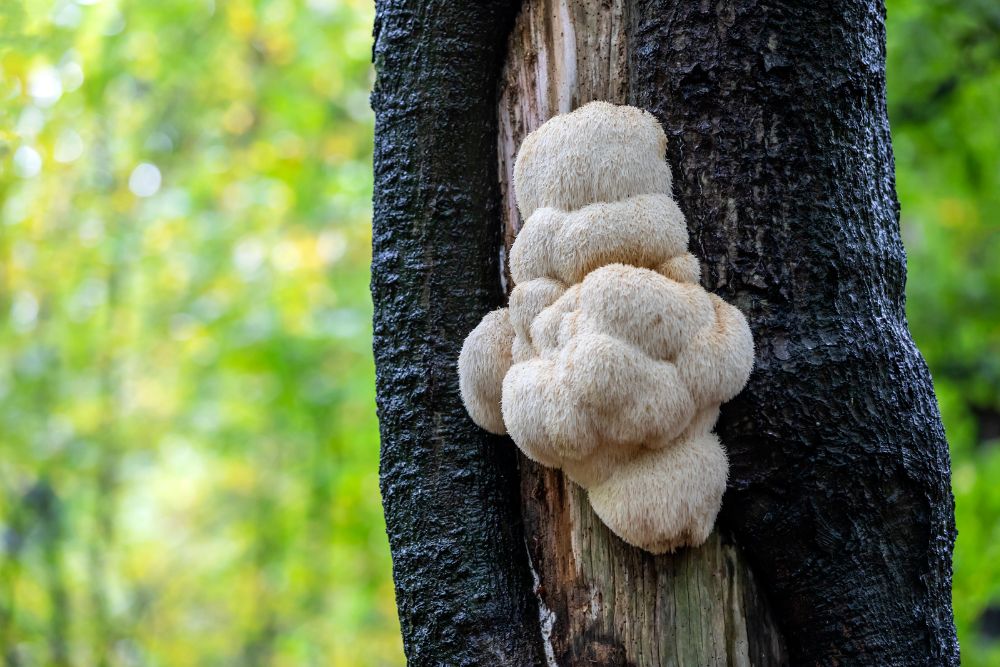Lion’s mane mushroom (Hericium erinaceus) has garnered attention for its potential health benefits, ranging from cognitive support to immune function.
This fascinating fungus has been used in traditional medicine for centuries, and modern research is beginning to validate its health-promoting properties.
Cognitive Function and Brain Health
One of the most well-known health benefits of lion’s mane is its potential to support cognitive function and overall brain health. Studies have shown that lion’s mane contains compounds called hericenones and erinacines, which can stimulate the production of nerve growth factor (NGF).
NGF is a protein crucial for the growth, maintenance, and survival of nerve cells, including brain neurons.
Research suggests that lion’s mane may help improve memory, focus, and cognitive function by promoting the regeneration of neurons and protecting them from damage. In a 2015 review of lion’s mane studies, researchers highlighted the mushroom’s potential to alleviate symptoms of neurodegenerative diseases, such as Alzheimer’s and Parkinson’s.
Immune Support
Lion’s mane mushroom has been shown to possess immune-boosting properties thanks to its rich array of bioactive compounds, such as beta-glucans, polysaccharides, and terpenoids.
These compounds have been found to stimulate the activity of immune cells, such as macrophages and natural killer cells, which play a crucial role in defending the body against pathogens and maintaining overall health.
Antioxidant Properties
Oxidative stress, caused by an imbalance between free radicals and antioxidants in the body, can contribute to the development of chronic diseases and aging. Lion’s mane mushroom is a natural source of potent antioxidants, which can help neutralize free radicals and protect the body from oxidative damage.
In the aforementioned 2015 review, researchers identified several antioxidant compounds in lion’s mane mushrooms, including phenolic compounds and flavonoids. These antioxidants may contribute to the mushroom’s health-promoting effects, such as supporting brain health and reducing inflammation.
Anti-Inflammatory Effects
Chronic inflammation has been linked to numerous health issues, including heart disease, diabetes, and arthritis. Lion’s mane mushroom contains compounds with anti-inflammatory properties, which may help reduce inflammation and alleviate associated symptoms.
For example, the polysaccharides found in lion’s mane have been shown to exhibit anti-inflammatory effects by inhibiting the production of pro-inflammatory molecules.
Digestive Health
Lion’s mane mushroom has been traditionally used to support digestive health. Recent research suggests that it may have a beneficial impact on gut health by promoting the growth of beneficial bacteria and reducing inflammation in the gut lining.
Lion’s mane contains compounds called prebiotics, which can stimulate the growth of probiotics, beneficial bacteria that play a crucial role in maintaining a healthy gut microbiome.
Furthermore, lion’s mane has been found to possess anti-ulcer and anti-gastritis properties, which may help protect the stomach lining and reduce the risk of developing peptic ulcers.
Cancer-Fighting Properties
Preliminary research suggests that lion’s mane mushroom may have potential cancer-fighting properties.
Studies have shown that some compounds found in lion’s mane, such as polysaccharides and terpenoids, can inhibit the growth of cancer cells and induce apoptosis (cell death) in cancerous cells. For example, a study published in the International Journal of Biological Macromolecules found that a polysaccharide from lion’s mane mushroom exhibited anti-tumour effects against human leukemia cells.
It’s important to note that while these findings are promising, more research is needed to fully understand the potential cancer-fighting properties of lion’s mane and its potential role in cancer treatment and prevention.
Cardiovascular Health
Lion’s mane mushroom may also contribute to cardiovascular health by reducing risk factors for heart disease.
Studies have shown that lion’s mane can help lower levels of LDL (“bad”) cholesterol and triglycerides, which are associated with an increased risk of heart disease.
Additionally, the mushroom has been found to exhibit anticoagulant properties, which may help prevent the formation of blood clots that can lead to heart attacks and strokes.
Diabetes Management
Research suggests that lion’s mane mushroom may help manage diabetes by improving blood sugar control and reducing the risk of complications associated with the condition.
In animal studies, lion’s mane has been shown to improve insulin sensitivity and reduce blood sugar levels. The mushroom may also help protect against diabetic complications, such as neuropathy, by promoting nerve regeneration and reducing oxidative stress.
Anxiety and Depression
Lion’s mane mushroom has been traditionally used to support mental health, and recent studies suggest that it may help alleviate symptoms of anxiety and depression.
In a 2010 study published in the journal Biomedical Research, researchers found that participants who took lion’s mane extract for four weeks experienced a significant reduction in anxiety and depression symptoms compared to a placebo group.
While the exact mechanism behind this effect is not yet fully understood, it is believed that the mushroom’s ability to stimulate the production of NGF and support neuron health may play a role in improving mood and reducing anxiety.
In Summary
Lion’s mane mushroom appears to offer a wide range of health-promoting effects, from supporting cognitive function and immune health to reducing inflammation and improving mental well-being. As research continues to uncover the potential benefits of this fascinating fungus, it’s clear that lion’s mane has much to offer in promoting holistic wellness.


